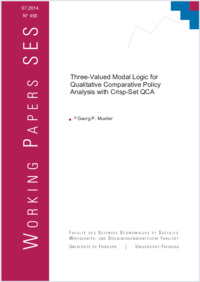Three-Valued Modal Logic for Qualitative Comparative Policy Analysis with Crisp-Set QCA
BP2-STS
-
01.07.2014
14
Three-valued modal logic
qualitative comparative analysis (QCA)
public policy
social security
international comparisons
English
Contradictory and missing outcomes are problems common to many qualitative comparative studies, based on the methodology of crisp-set QCA. They also occur in public policy analyses, e.g. if important background variables are omitted or outcomes of new policies are technically censored. As a new solution to these problems, this article proposes the use of three-valued modal logic, originally introduced by the Polish philosopher Jan Lukasiewicz (1970). In addition to true and false, indeterminate is the third truth-value in this alternative approach, which serves to code missing or contradictory data. Moreover, modal operators allow a differentiation between strict and possible triggers and inhibitors of policy outcomes. The advantages of three-valued modal logic in crisp-set QCA are illustrated by an empirical example from comparative welfare policy analysis. Its conclusions allow comparisons with the corresponding results from a conventional crisp-set QCA of the same data-set.
- Collections
- Faculty
- Faculté des sciences économiques et sociales et du management
- Language
-
- English
- Classification
- Politics
- Series statement
-
- Working Papers SES ; 450
- License
-
License undefined
- Identifiers
-
- RERO DOC 210323
- RERO R007827700
- Persistent URL
- https://folia.unifr.ch/unifr/documents/303604
Statistics
Document views: 163
File downloads:
- Document: 952
